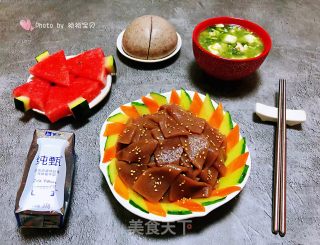Vegetarian Fried Konjac
1.
Prepare the raw materials konjac, cucumber and carrot for later use.
2.
Wash the cucumber, drain the water, and cut into horseshoe skins.
3.
Wash the carrots, drain the water, and cut into horseshoe skins.
4.
Put the konjac chips in a pot of boiled water and blanch it for not too long.
5.
The blanched konjac is immediately placed in cold water and rinsed to drain the water for later use.
6.
Pour an appropriate amount of base oil into the pot and heat, add the onion, ginger, and garlic until fragrant.
7.
Add carrot slices and stir fry until the color changes.
8.
Add the konjac slices and stir fry evenly.
9.
Add the cucumber slices and add salt and MSG at the same time.
10.
Stir-fry quickly over high heat until the seasonings are fully flavored and finally drizzle with sesame oil before serving.
11.
Put the cucumber and carrot slices on the plate first, then put the konjac slices and you're done.
12.
Pairing with buckwheat buns, hot tofu soup, and watermelon is a nutritious breakfast.
13.
Sprinkle the right amount of sesame seeds to improve the appearance and satisfy the taste buds.
14.
Konjac's nutritional value is very rich. Appetite diabetic patients often consume it.
15.
The konjac is fragrant and delicious, with a slightly crunchy texture.
16.
A nutritious breakfast will bring people a very pleasant mood all day long.


Tips:
Konjac contains 35% starch, 3% protein, multiple vitamins and mineral elements such as potassium, phosphorus and selenium. It also contains up to 30% of the konjac polysaccharide needed by humans, namely glucomannan.
1. Konjac also contains a kind of natural antibacterial. It uses refined konjac powder as the main raw material. When food is made with other raw materials, konjac can form an antibacterial film on the food surface, which can prevent bacterial invasion, prolong storage time, and protect freshness. The role of bacteria.
2. The mucus protein contained in konjac can reduce the accumulation of cholesterol in the body, prevent arteriosclerosis and prevent cardiovascular and cerebrovascular diseases.
3. Eating konjac can improve the body's immunity. The mannose anhydride contained in it can interfere with the metabolism of cancer cells. The excellent dietary fiber contained in it can stimulate the body to produce a substance that kills cancer cells and can prevent cancer.
4. The glucomannan contained in konjac has strong swelling power and is more viscous than any kind of vegetable glue. It can fill the intestines and stomach, eliminate hunger, have low calories, eat grams to control weight, and achieve the purpose of weight loss and fitness.